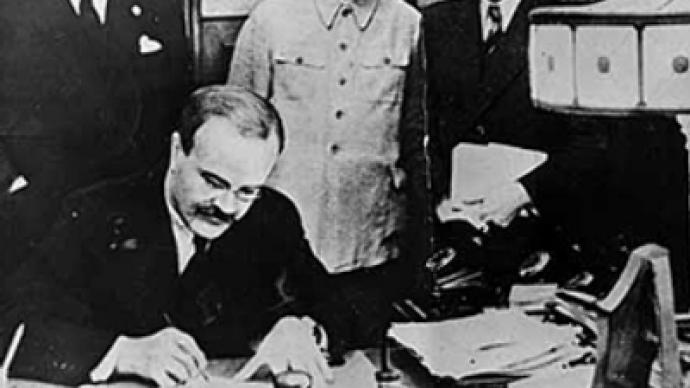Poland accuses Russian TV channel of rewriting history

Poland’s Foreign Ministry has issued an official protest to their Russian counterparts over a history documentary, part of which was aired last Sunday. They say the film puts part of the blame for World War II on Warsaw.
The film produced and shown by the national Channel Rossiya tells the story of the treaty between Nazi Germany and Soviet Union signed in 1939, the Molotov–Ribbentrop Pact. The non-aggression agreement had a secret protocol dividing Eastern Europe between German and Soviet spheres of influence. This later led to Germany and the Soviet Union annexing the corresponding territories.
The documentary claims that Warsaw was trying to sink down Germany’s plans to secure Moscow’s neutrality and invade Poland by convincing Japan to attack Soviet Union in the Far East.
“Poland has reasons to see Hitler as an ally, namely the 1934 treaty. In its secret part Berlin and Warsaw promised each other military help,” says in the film its author, journalist Ilya Kanavin.
Warsaw believes this documentary puts part of the blame for the beginning of World War II on Poland, reports on Friday Kommersant daily. A note of protest published by the Polish embassy in Moscow brands the documentary as “a vivid attempt to falsify history” and “a clumsy attempt to review the work of both Polish and Russian historians.” It also lashes at the authors for failing to mention that the Soviet Union violated a non-aggression agreement with Poland when it invaded the country in 1939.
The embassy suggests that the film should be considered by the presidential commission formed recently to fight against revisionism.
Channel officials so far have not commented the accusations, while the foreign ministry said it was confused about why this issue was addressed to it.
“Opinions voiced by TV channels should not be subject of consideration of official agencies. What times exactly is it suggested that we return to? There’s freedom of speech,” the response of the European department of the ministry says.
Speaking unofficially, a source in the ministry said Poland was using double standards.
“If we drew attention to everything said on Polish national channels about Russia and Soviet history, it would have been another case,” the diplomat told the newspaper.
Poland and Russia have quite a number of past and present grudges, which the countries find difficult to overcome. On Wednesday, Nezavisimaya Gazeta newspaper reported that at least one of them – the dispute over the Katyn massacre – may soon be closed. The mass killing of Polish prisoner soldiers and officers by Soviet secret police has been marring bilateral relations between Moscow and Warsaw for years, but thanks to the work of a commission for settlement of the issue it may be taken away from the political agenda soon.
The settlement, which entails Russia giving Poland access to classified material on the case in exchange for shelving it, is expected before September this year, when Prime Minister Putin is to visit Poland to take part in commemorations dedicated to the beginning of World War II, the newspaper says.












